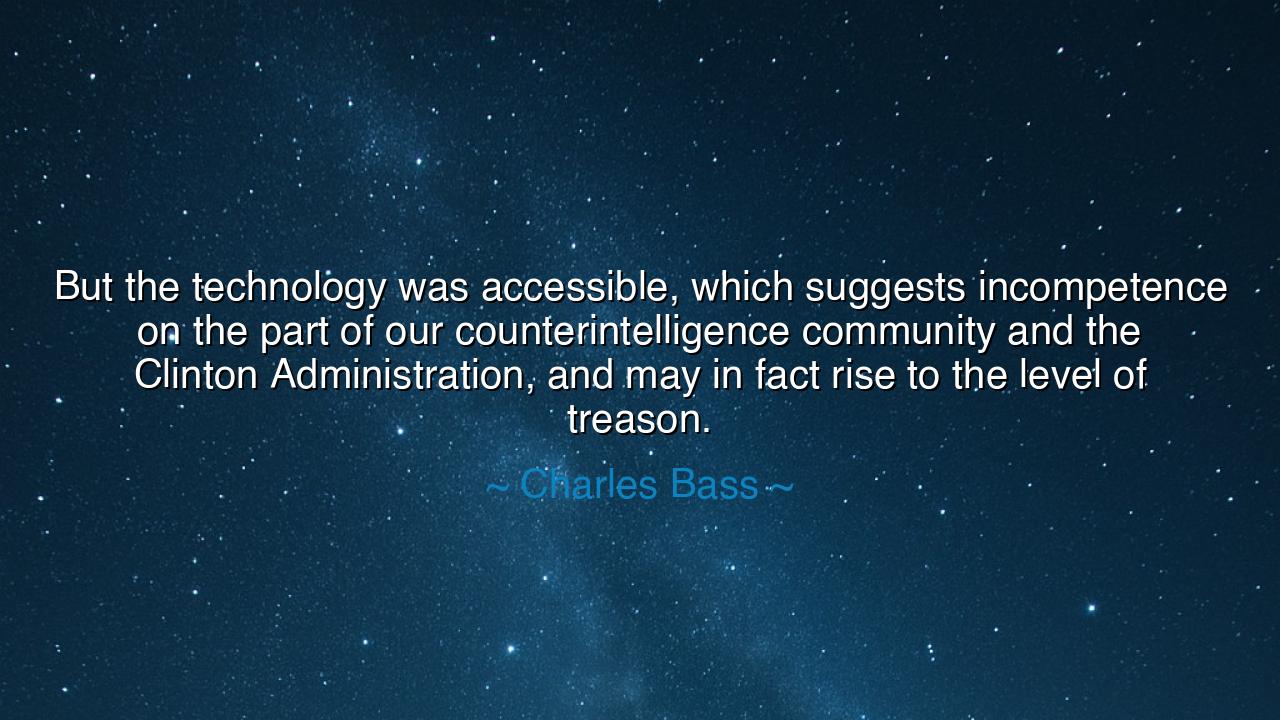
But the technology was accessible, which suggests incompetence
But the technology was accessible, which suggests incompetence on the part of our counterintelligence community and the Clinton Administration, and may in fact rise to the level of treason.






Hear the fierce words of Charles Bass, who in the halls of power spoke with indignation: “But the technology was accessible, which suggests incompetence on the part of our counterintelligence community and the Clinton Administration, and may in fact rise to the level of treason.” These words burn like fire, for they call forth one of the gravest charges that can be made in a republic: that negligence or betrayal in the stewardship of technology and secrets may imperil the safety of the nation itself. They are not idle musings, but a warning of how fragile trust becomes when the guardians of security fail.
The origin of this saying lies in the late 1990s, a time when America stood as the unrivaled power after the Cold War. Yet even in that moment of supremacy, whispers arose of secrets lost, of nuclear designs and military technologies falling into the hands of rivals. Reports of Chinese espionage at the Los Alamos nuclear laboratory brought storms of outrage, and Bass, a congressman of New Hampshire, voiced the fear that if such accessible technology was not guarded, then the lapse was not mere mistake, but a betrayal of duty—a breach that could even be seen as treason.
Consider the gravity of what he said: that failure to safeguard vital counterintelligence is not only incompetence but a danger to the entire body of the nation. In this we see an eternal truth: when the weapons of the age—be they swords, cannons, or nuclear secrets—are allowed to fall into the hands of adversaries, the negligence of the few becomes the peril of the many. In ancient times, a guard who slept at the city gate could doom his people. In modern times, the gatekeeper is the counterintelligence officer, the administrator, the leader—and if they fail, millions may pay the price.
History offers us many examples. Think of the betrayal of Benedict Arnold, who sought to deliver West Point to the British during the American Revolution. His act was not one of ignorance but of treason, and had he succeeded, the war might have been lost. Likewise, in the Second World War, the secrets of the atomic bomb were stolen by spies and delivered to the Soviet Union. The result was not only the swift rise of a rival power, but the beginning of the long shadow of the Cold War. Here again, we see the dangerous marriage of technology and treachery, and the price humanity pays when guardians fail their trust.
The heart of Bass’s warning is this: accessible technology without vigilance is a blade pointed at one’s own heart. It matters little how advanced a nation’s tools may be if they are left unguarded, if enemies may simply reach out their hand and take them. In such carelessness lies not only incompetence but betrayal, for the first duty of leadership is protection. And when that duty is forsaken, whether by malice or neglect, the line between error and treason becomes perilously thin.
The lesson for us is eternal and urgent. In every age, men must guard what is precious—whether it be the grain in their storehouses, the walls of their cities, or the secrets of their technologies. Trust must be coupled with vigilance, innovation with protection. Leaders must be held accountable, for negligence at the highest levels can undo the labors of countless faithful citizens. And each of us, in our own sphere, must remember that the treasures of knowledge and trust entrusted to us are not ours alone, but the inheritance of the generations.
So I say to you, children of tomorrow: remember Bass’s warning. Let no comfort make you careless, and let no negligence put your people at risk. For a great nation may be undone not only by enemies without, but by failures within. Guard your technology, guard your secrets, guard your trust. And above all, hold your leaders to account, for in their hands rests the fate of millions. In vigilance lies survival, and in the betrayal of vigilance lies ruin.






AAdministratorAdministrator
Welcome, honored guests. Please leave a comment, we will respond soon